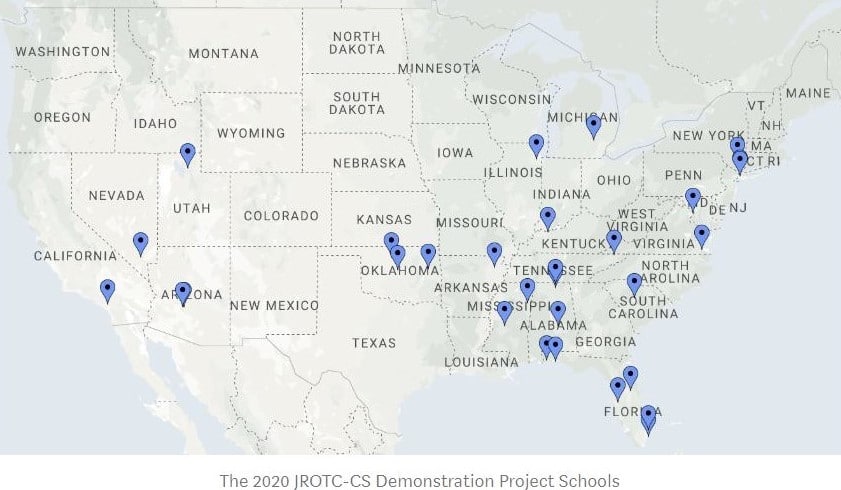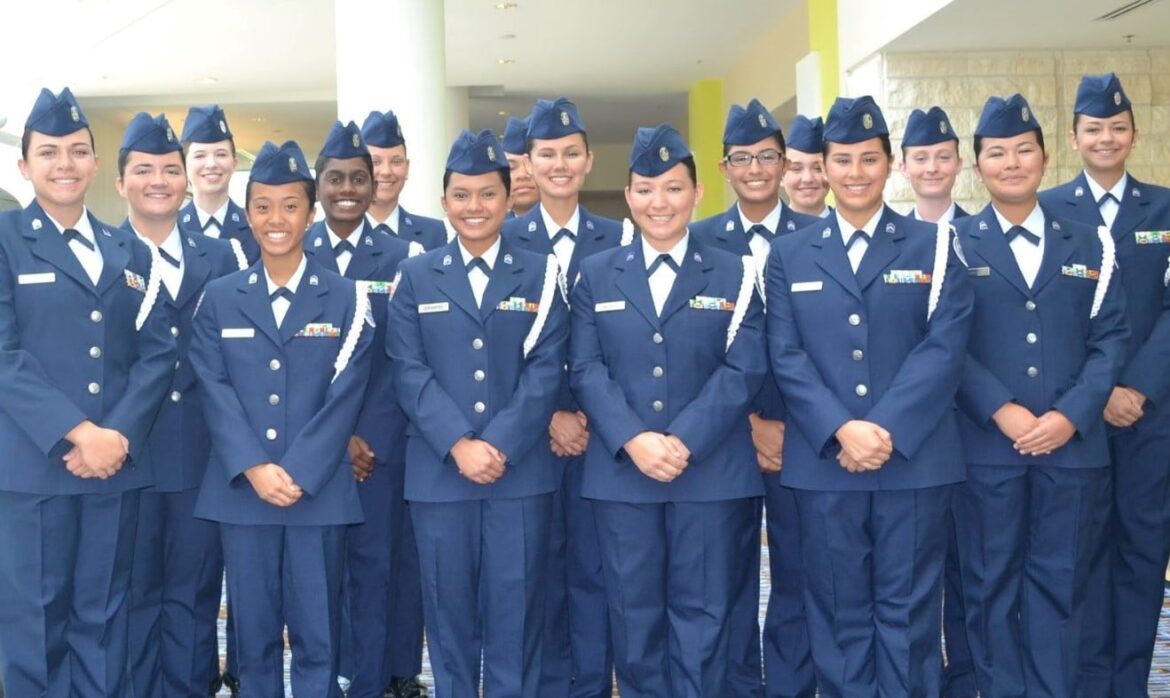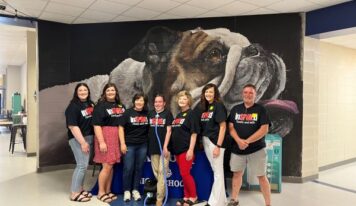FROM ELIZABETH FAWCETT
RAFFETTO HERMAN STRATEGIC COMMUNICATIONS
Prattville High School is one of 30 schools across the country selected to pilot a new Junior Reserve Officers Training Corps (JROTC) initiative to prepare the next generation of computer science and cybersecurity professionals.
The pilot, led by CSforALL with support from companies including Intel Corporation, is working to bridge the computer science education access gap at JROTC schools across the country, giving students improved access to the education they need for the high-tech jobs of the future. As a participant, Prattville High School will receive professional development for teachers and internship, mentoring and scholarship opportunities for students.
There are approximately 545K JROTC cadets across the country, who represent a highly diverse, largely economically disadvantaged population of untapped tech talent
This program gives them the education they need for high paying tech jobs in the future
Today, 68% of JROTC cadets do not have access to AP Computer Science courses

The program will eventually benefit 60K high school students nationwide as the capacity for cybersecurity and CS education at their schools grow
CSforALL, the national hub of the Computer Science for All movement, and Air Force Junior ROTC, one of the largest character development and citizenship programs for youth, announced 30 schools selected to join the JROTC-CS Demonstration Project, a new public-private partnership aimed at bridging the CS education access gap at Junior ROTC schools. Today only 32% of Junior ROTC high schools offer an Advanced Placement (AP) computer science course.
The contributions of the piloting schools will inform the development of a scalable model for CS and cybersecurity education to be deployed across the nationwide JROTC network of over 3400 high schools. The initial cohort of 30 schools represent 16 states and were selected from nearly 900 Air Force Junior ROTC host schools across the United States. These schools will receive school-level capacity building training, professional development for both teachers and Junior ROTC instructors, and internship, mentoring and scholarship opportunities for the students.
Collectively, these 30 schools serve more than 4000 Junior ROTC cadets and nearly 55K students overall. Half of the selected schools qualify as Title 1 (more than 50% of students receiving free or reduced lunch), and the total student population served is 58% minority and 48% female.
“The Junior ROTC offers a uniquely scalable opportunity to rapidly grow and diversify the pool of talent entering computing and cybersecurity careers,” said Ruthe Farmer, Chief Evangelist, CSforALL. “These young people are already preparing to be leaders. In today’s environment, technology must be part of that preparation.”
“Air Force Junior ROTC is committed to developing young citizens that exhibit responsibility, character and leadership. Whether they enter public service or the private sector, we know preparation in technology will be critical to their success.” said Col. Stephen Sanders, Director, Air Force Junior ROTC. “We are grateful to our JROTC unit leaders and host schools for contributing to this project.”
This project supports the goals of the JROTC Cyber Training Act of 2019 (H.R. 3266 and Sen. 2154) and is in alignment with Section 512 of the 2020 National Defense Authorization Act, which amended Section 2031(b)(3) of title 10, United States Code, to include instruction or activities in the fields of science, technology, engineering, and mathematics (STEM) in the JROTC program. At scale, this project has the potential to engage over 545K high school students in computer science and cybersecurity education pathways, as well as build technology education capacity at over 3400 JROTC high schools, serving 4M students overall.
“Developing home-grown talent in tech and cybersecurity is critical for U.S. innovation and national security. Investing in the next generation of servicemen and women helps ensure we are prepared for the future of combat. I’m looking forward to seeing these 30 schools step up to the challenge, especially Dobyns-Bennett High School from Kingsport, Tenn.” — Senator Marsha Blackburn (R-Tenn.)
“We put our nation at risk if we don’t address our severe cybersecurity workforce shortage,” said Senator Jacky Rosen (D-NV). “I’m thrilled to see the cybersecurity education community promote JROTC cybersecurity programs across the country, including at Shadow Ridge High School in Las Vegas. I’m proud to support this effort with my bipartisan JROTC Cyber Training Act, which would invest in the cybersecurity training of our future service-members at all JROTC schools in America.”
“Utah, like most states, has a shortage of technology talent,” said Congressman Rob Bishop (R-UT 1st District). “I’m grateful to the Utah Military Academy and the 29 other schools across the US collaborating on this innovative approach to increase youth participation in computing and cybersecurity career pathways.”
“With the changing needs of our economy and the armed services, it is vital that we provide training in the technical skills that will best serve our students for their future,” said Congresswoman Lizzie Fletcher (TX-07), who introduced the JROTC Cyber Training Act in the House last year. “I’m thrilled to see so many organizations and schools stepping up to support this innovative approach to talent development and support the JROTC Cyber Training Act.”
The JROTC-CS Demonstration Project is public-private partnership led by CSforALL in collaboration with the JROTC-CS Advisory Consortium Members including:
Air Force Association’s CyberPatriot; U.S. Air Force Junior ROTC HQ; Capital One; Google; Intel Corporation; Lockheed Martin; Microsoft; Mississippi State University; National Initiative for Cybersecurity Education (NICE); National Integrated Cyber Education Research Center (NICERC); SANS Institute; Snap Inc.; The College Board; The Internet Institute
Interested in learning more, visit https://www.csforall.org/projects_and_programs/jrotc/
About CSforALL:
CSforALL is the national hub of the Computer Science for all Movement with a mission to make high-quality computer science an integral part of K-12 education in the United States. Our three-pillar approach; Support Local Change, Increase Rigor and Equity, and Grow the Movement, directs our work across a national and local spectrum to provide equitable and accessible K-12 computer science education to every student. We engage with diverse stakeholders leading computer science initiatives across the nation to support and facilitate implementation of rigorous, inclusive and sustainable computer science. For more information: www.csforall.org Twitter: @CSforALL
About Air Force Junior ROTC:
Air Force Junior ROTC is one of the Air Force’s largest educational programs operating in almost 900 high schools across the country and 15 overseas locations. More than 125,000 students in 9th through 12th grades are positively influenced every day. Air Force Junior ROTC’s focus is developing citizenship, leadership, character, responsibility and service oriented young people. This is accomplished through a world-class accredited curriculum, and disciplined uniformed environment, wrapped in aerospace and STEM related learning opportunities.






